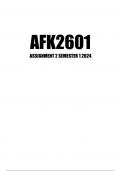Svr - Study guides, Class notes & Summaries
Looking for the best study guides, study notes and summaries about Svr? On this page you'll find 1931 study documents about Svr.
Page 4 out of 1.931 results
Sort by
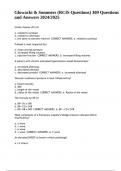
-
Glowacki & Sommers (RCIS Questions) 309 Questions and Answers 2024/2025.
- Exam (elaborations) • 55 pages • 2024
-
- $13.99
- + learn more
Glowacki & Sommers (RCIS Questions) 309 Questions and Answers 2024/2025. Stroke Volume (SV) is? a. related to preload b. related to afterload c. the same as ejection fraction CORRECT ANSWERS: a. related to preload Preload is most impacted by? a. mean arterial pressure b. increased filling volumes c. ejection fraction CORRECT ANSWERS: b. increased filling volumes A patient with chronic untreated hypertension would demonstrate? a. increased afterload b. decreased aferload c. decreased ...
AFK2601 Assignment 2 CONTAINS WORKINGS EXPLANATIONS AND SOLUTIONS WHICH ARE 100% SURE
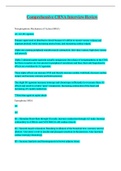
-
Comprehensive CRNA Interview Review Accurate responses are given.
- Presentation • 70 pages • 2023
-
- $18.99
- 3x sold
- + learn more
Comprehensive CRNA Interview Review Accurate responses are given. Comprehensive CRNA Interview Review Norepinephrine Mechanism of Action (MOA) A1, A2, B1 agonist. Primary agent used in distributive shock because it's ability to recruit venous volume and augment preload, while increasing arterial tone, and increasing cardiac output. Alpha one causing peripheral smooth muscle contraction. (low dose venous, high dose venous and arterial). Alpha 2 adrenoreceptor agonism actually ant...
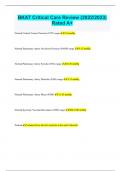
-
BKAT Critical Care Review (2022/2023) Rated A+
- Exam (elaborations) • 12 pages • 2023
- Available in package deal
-
- $9.99
- 2x sold
- + learn more
BKAT Critical Care Review (2022/2023) Rated A+ Normal Central Venous Pressure (CVP) range 2-8 mmHg Normal Pulmonary Artery Occlusion Pressure (PAOP) range 6-12 mmHg Normal Pulmonary Artery Systolic (PAS) range 20-30 mmHg Normal Pulmonary Artery Diastolic (PAD) range 5-15 mmHg Normal Pulmonary Artery Mean (PAM) 11-20 mmHg Normal Systemic Vascular Resistance (SVR) range 800-1200 mmHg Preload volume left in the left ventricle at the end of diastole What is preload affected by? venous return ...
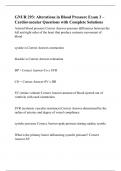
-
GNUR 293: Alterations in Blood Pressure Exam 3 – Cardiovascular Questions with Complete Solutions
- Exam (elaborations) • 13 pages • 2024
-
- $17.49
- + learn more
Arterial blood pressure Correct Answer-pressure differences between the left and right sides of the heart that produce systemic movement of blood systole is Correct Answer-contraction diastole is Correct Answer-relaxation BP = Correct Answer-Co x SVR CO = Correct Answer-SV x HR SV (stroke volume) Correct Answer-amount of blood ejected out of ventricle with each contraction SVR (systemic vascular resistance) Correct Answer-determined by the radius of arteries and degree of vesse...
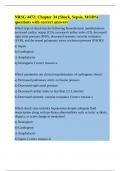
-
NRSG 4472: Chapter 34 (Shock, Sepsis, MODS) questions with correct answers
- Exam (elaborations) • 24 pages • 2024
-
- $15.49
- + learn more
Which type of shock has the following hemodynamic manifestations: increased cardiac output (CO), increased cardiac index (CI), decreased right atrial pressure (RAP), decreased systemic vascular resistance (SVR), and decreased pulmonary artery occlusion pressure (PAOP)? a) Septic b) Cardiogenic c) Anaphylactic d) Neurogenic Correct Answer-a Which parameters are clinical manifestations of cardiogenic shock? a) Decreased pulmonary artery occlusion pressure b) Decreased right atrial pressur...
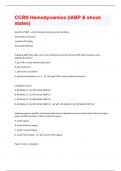
-
CCRN Hemodynamics (IABP & shock states) Questions and Answers well Explained Latest 2024/2025 Update 100% Correct.
- Exam (elaborations) • 19 pages • 2024
- Available in package deal
-
- $7.99
- + learn more
benefits of IABP - increased coronary artery perfusion decreased O2 demand increased O2 supply decreased afterload Pt getting IABP. Hour after return from Cath lab, pt has had minimal UOP. What would be most appropriate action? A. get CXR to verify catheter placement B. give fluid bolus C. administer furosemide D. decreased frequency to 1:2 - A. get CXR to verify catheter placement Cardiogenic shock: A. BP 96/54, CI 1.8, PAP 54/26, PAOP 10 B. BP 84/52, CI 1.9, PAP 32/18, PAOP 12 C. ...
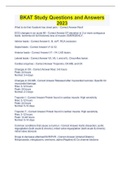
-
BKAT Study Questions and Answers 2023
- Exam (elaborations) • 12 pages • 2023
- Available in package deal
-
- $12.79
- 1x sold
- + learn more
BKAT Study Questions and Answers 2023 What to do first if patient has chest pain. - Correct Answer Rest! ECG changes in an acute MI - Correct Answer ST elevation in 2 or more contiguous leads. Ischemia d/t full thickness loss of muscle. EMERGENCY. Inferior leads - Correct Answer II, III, aVF. RCA occlusion. Septal leads - Correct Answer V1 & V2. Anterior leads - Correct Answer V1 - V4. LAD lesion. Lateral leads - Correct Answer V5, V6, I, and aVL. Circumflex lesion. Cardiac e...
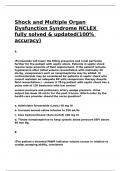
-
Shock and Multiple Organ Dysfunction Syndrome NCLEX fully solved & updated(100% accuracy)
- Exam (elaborations) • 32 pages • 2024
-
- $13.49
- + learn more
A (Furosemide will lower the filling pressures and renal perfusion further for the patient with septic shock. Patients in septic shock require large amounts of fluid replacement. If the patient remains hypotensive after initial volume resuscitation with minimally 30 mL/kg, vasopressors such as norepinephrine may be added. IV corticosteroids may be considered for patients in septic shock who cannot maintain an adequate BP with vasopressor therapy despite fluid resuscitation.) A 78-kg patient ...
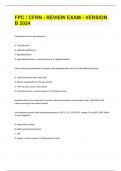
-
FPC / CFRN - REVIEW EXAM - VERSION B 2024
- Exam (elaborations) • 46 pages • 2024
-
- $16.49
- + learn more
FPC / CFRN - REVIEW EXAM - VERSION B 2024 Myxedema coma is also known as... A. Thyroid storm B. Adrenal insufficiency C. Hypothyroidism D. Hyperaldosteronism - correct answer Hypothyroidism Most common presentation of a patient with hypothyroidism are all of the following, Except... A. Cold intolerance with coarse hair B. Almost exclusively over the age of sixty C. >90% of cases occur in the winter D. Primarily in men - correct answer Primarily in men Hypothroidism occu...

$6.50 for your textbook summary multiplied by 100 fellow students... Do the math: that's a lot of money! Don't be a thief of your own wallet and start uploading yours now. Discover all about earning on Stuvia

